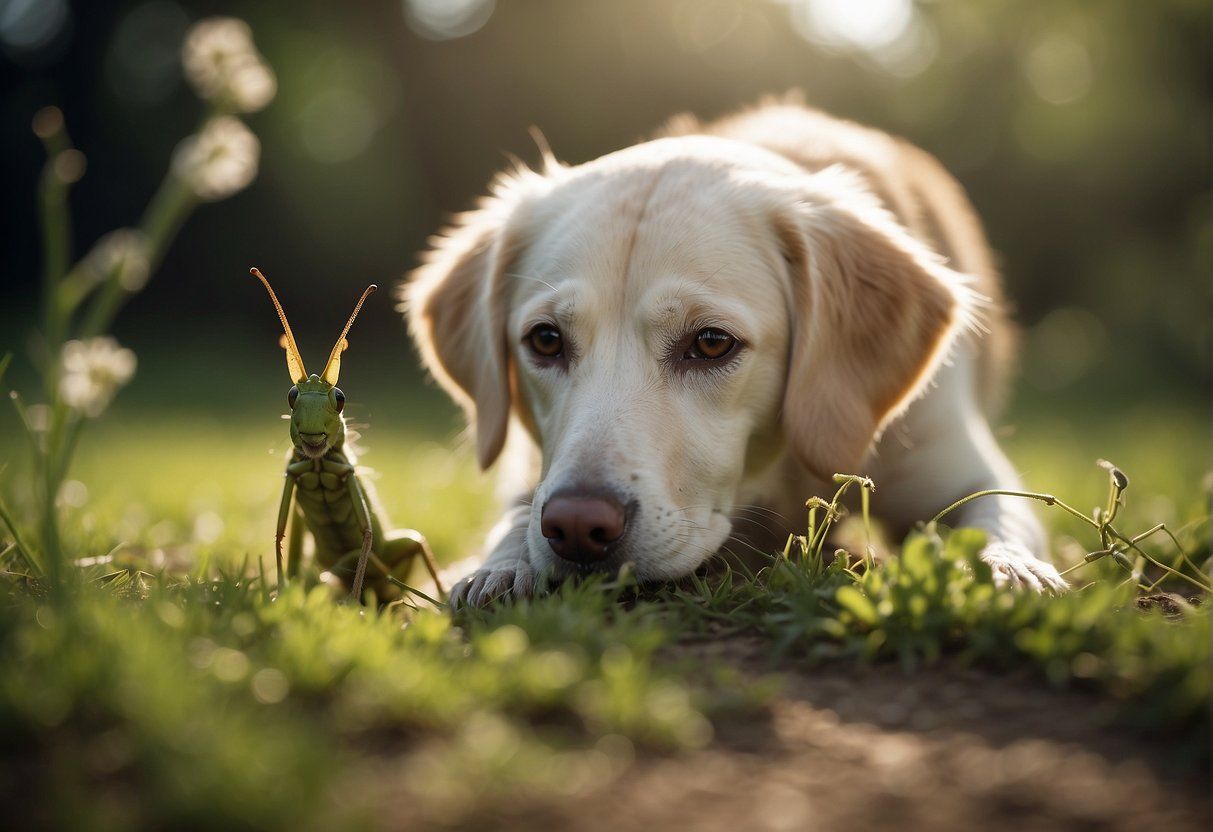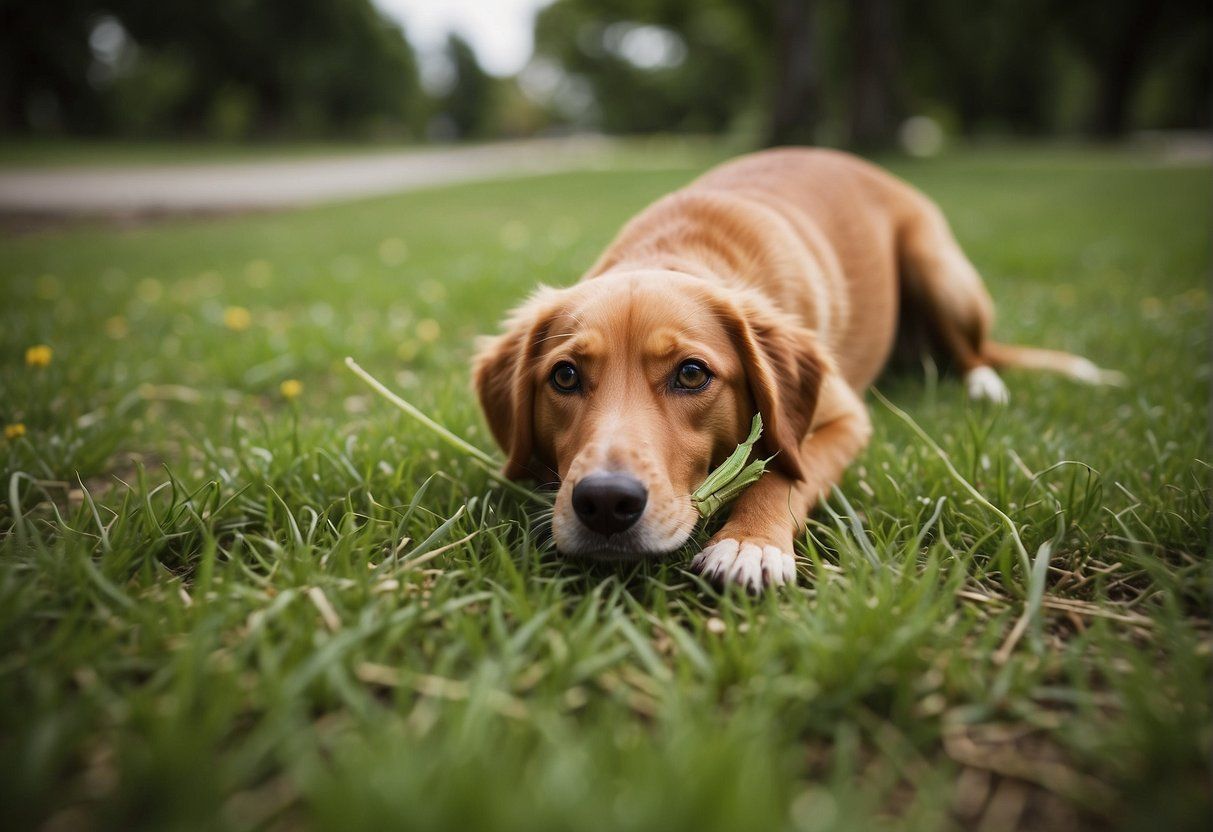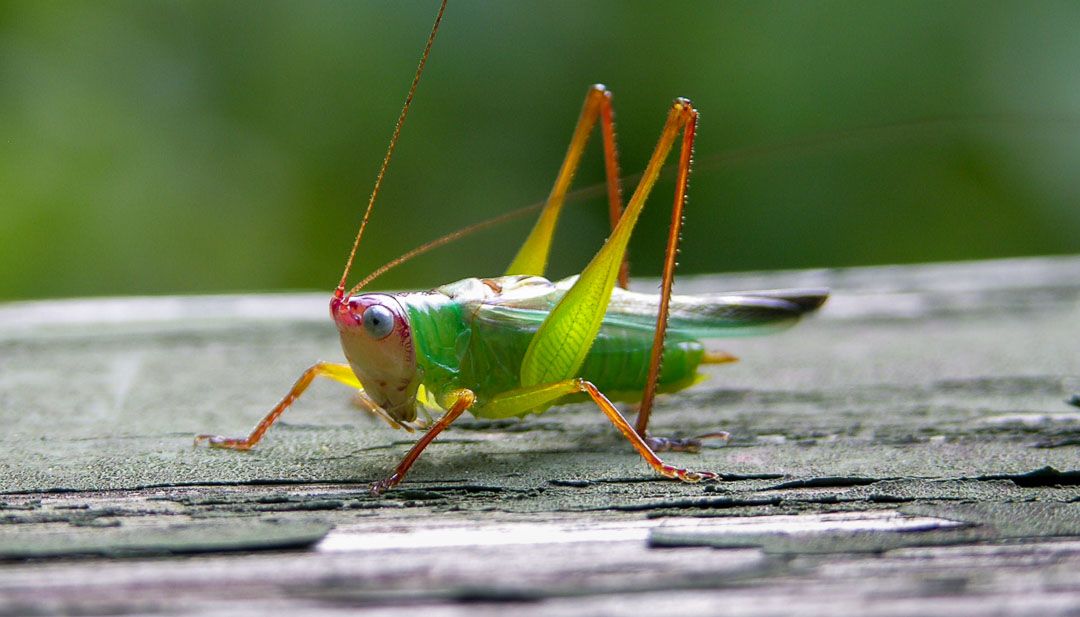Can Dogs Eat Grasshoppers? Will They Get Sick?
Can Dogs Eat Grasshoppers? Will They Get Sick?

Vet Reviewed

By: Sarah Hodgson
January 1, 1970
Table of Contents
Dogs are known to be curious creatures and will eat almost anything that comes their way. As a result, many dog owners wonder if it is safe for their furry friends to eat grasshoppers. The short answer is that it depends on the situation.
Grasshoppers are not toxic to dogs and can be a good source of protein. However, if the grasshoppers carry toxins or pesticides, they can cause food poisoning and make the dog sick. It is important to monitor your dog and contact a veterinarian if they show any signs of illness after eating a grasshopper.
While it is unlikely that a single grasshopper will cause any serious consequences, it is best to err on the side of caution and keep an eye on your pet. Now that we know a little more let's dive into the risks and answer some questions.
Let's dive in!
Why Do Dogs Eat Grasshoppers?
Dogs are known to be curious creatures, and they may try eating just about anything that catches their attention. This includes grasshoppers, which may seem like an unusual snack for a dog. However, there are several reasons why dogs may be attracted to grasshoppers.
1. Nutritional Value
Grasshoppers are a good source of protein for dogs. They contain essential amino acids that help in building and repairing muscles. Additionally, grasshoppers are rich in vitamins and minerals, such as calcium, iron, and B vitamins, which are beneficial for a dog's health.
2. Instinctive Behavior
Dogs are descendants of wolves, and wolves are known to hunt and eat insects. Eating insects is an instinctive behavior for dogs, and they may be drawn to grasshoppers as a result.
3. Taste and Texture
Some dogs may simply enjoy the taste and texture of grasshoppers. Dogs have a keen sense of smell and taste, and they may find the flavor and texture of grasshoppers appealing.

Are Grasshoppers Toxic to Dogs?
Grasshoppers are not toxic to dogs, and it is unlikely that your dog will suffer serious consequences after eating one. In fact, they can provide a source of protein. However, it is essential to note that grasshoppers can carry toxins that can make your dog sick, causing food poisoning.
Dogs have sensitive stomachs compared to humans, and most dogs can experience nausea. If your dog eats a large number of grasshoppers, it may end up with an upset stomach and symptoms like vomiting and diarrhea. Therefore, it is crucial to monitor your dog's behavior and health after eating grasshoppers.
It is also essential to note that some dogs may have an allergic reaction to grasshoppers, which can cause severe symptoms like swelling, hives, and difficulty breathing. If you notice any of these symptoms in your dog after eating grasshoppers, you should contact your veterinarian immediately.
Can Dogs Eat Cooked Grasshoppers?
Cooked grasshoppers are generally safe for dogs to consume, but there are a few things to keep in mind.
- First, it's important to ensure that the grasshoppers are cooked thoroughly, as raw grasshoppers can contain harmful bacteria that can make your dog sick.
- Additionally, it's important to avoid seasoning the grasshoppers with any spices or seasonings that may be harmful to dogs, such as garlic or onion.
Cooked grasshoppers can be a good source of protein for dogs, and may even provide some essential nutrients. However, it's important to keep in mind that grasshoppers should be fed to dogs in moderation, as too much of any new food can upset their stomachs.
If you're considering feeding your dog cooked grasshoppers, it's a good idea to consult with your veterinarian first. They can help you determine if grasshoppers are a good addition to your dog's diet, and can provide guidance on how much to feed and how often.
The Risks of a Dog Eating Grasshoppers
When it comes to dogs eating grasshoppers, there are various risks involved. In this section, we will discuss some of the potential risks that dogs may face when consuming grasshoppers.
Digestive System Response
Dogs have sensitive digestive systems, and consuming grasshoppers may cause an upset stomach, vomiting, and diarrhea. The exoskeleton of grasshoppers can be difficult for dogs to digest, leading to blockages in the digestive tract. This can be particularly dangerous for small dogs.
Potential for Parasites and Toxins
Grasshoppers may carry parasites and toxins that can be harmful to dogs. These can include tapeworms, roundworms, and other parasites. Additionally, grasshoppers may have come into contact with pesticides or other chemicals that can be toxic to dogs.
Allergic Reactions in Dogs
While most dogs can tolerate eating a harmless little grasshopper without any consequences, some may have an allergic reaction. Signs of an allergic reaction include itching, swelling, and difficulty breathing. If your dog experiences any of these symptoms after eating a grasshopper, seek veterinary attention immediately.
What Happens If My Dog Eats a Grasshopper?

Dogs are naturally curious creatures and may be tempted to eat grasshoppers. While grasshoppers are not toxic to dogs, they can still cause health problems if consumed in large quantities or if they are contaminated with harmful substances.
If your dog eats a grasshopper, the following symptoms may occur:
Upset Stomach
Grasshoppers are not part of a dog's regular diet and may cause digestive problems. Eating grasshoppers may cause nausea, vomiting, diarrhea, and loss of appetite in dogs. If your dog shows any of these symptoms after eating a grasshopper, it is best to monitor them and seek veterinary care if the symptoms persist.
Pesticide Poisoning
If the grasshoppers your dog ate were sprayed with pesticides, fertilizers, or other harmful chemicals, your dog may experience pesticide poisoning. Signs of pesticide poisoning in dogs include excessive drooling or panting, vomiting, diarrhea, and seizures. If you suspect that your dog has ingested pesticides, seek veterinary care immediately.
Internal Parasites
Grasshoppers can carry internal parasites, such as tapeworms and roundworms, which can infect your dog if they eat the grasshopper. These parasites can cause a range of health problems, including weight loss, diarrhea, and poor coat condition. If you suspect that your dog has internal parasites, seek veterinary care as soon as possible.
Will My Dog Get Sick From Eating Grasshoppers?
Will your dog get sick from eating grasshoppers?
In general, eating grasshoppers is not harmful to most dogs. In fact, they can provide a source of protein. However, there are some things to keep in mind.
- Firstly, if the grasshoppers were sprayed with pesticides, fertilizers, or even anti-fungal agents, these could make your dog sick. Signs that your dog may be poisoned include excessive drooling or panting, vomiting, diarrhea, and seizures. If you suspect your dog has eaten grasshoppers that were sprayed with chemicals, it's important to seek veterinary attention immediately.
- Secondly, the size of the grasshopper matters. Small insects typically won't cause any harm, but larger ones can pose a choking hazard or lead to gastrointestinal issues. It's best to monitor your dog after they eat anything unusual and seek veterinary attention if necessary.
- Lastly, it's important to note that dogs have sensitive stomachs compared to humans. Eating too many grasshoppers or any other unusual food can cause nausea and vomiting. If your dog starts showing signs of discomfort after eating grasshoppers, it's best to withhold food for a few hours and monitor their behavior.
While eating grasshoppers is generally safe for dogs, it's important to keep an eye on them and seek veterinary attention if necessary. If you're unsure whether your dog should be eating a particular food, it's always best to consult with your veterinarian.
What Should I Do If My Dog Ate a Grasshopper?
If your dog has eaten a grasshopper, you should observe him for any signs of discomfort or illness. While most dogs do not experience serious issues after eating a grasshopper, there is still a risk of minor gastrointestinal upset or potential internal parasites.
Here are some steps you can take if your dog has eaten a grasshopper:
- Observe your dog for any signs of discomfort or illness, such as vomiting, diarrhea, or lethargy. If you notice any of these symptoms, contact your veterinarian immediately.
- If your dog has eaten a large number of grasshoppers, or if you suspect that the grasshoppers he ate were sprayed with pesticides or other chemicals, contact your veterinarian right away.
- You can also give your dog some plain, unsweetened yogurt or probiotic supplements to help support his digestive system.
- Make sure to keep your dog hydrated by offering him plenty of fresh, clean water to drink.
- If you are concerned about your dog's health or if he is showing any signs of illness, it is always best to consult with your veterinarian. They can provide you with the best advice on how to care for your dog and keep him healthy.
The Bottom Line
So there you have it, while grasshoppers may be a tempting snack for dogs, it's important to monitor their intake and ensure they are not consuming them in excess. If you have any concerns about your dog's diet or health, consult with your veterinarian.
Stay safe!
Frequently Asked Questions
Are there any health risks associated with dogs eating locusts or crickets?
Like grasshoppers, locusts and crickets are not toxic to dogs. However, consuming large amounts of these insects may cause digestive problems in dogs, such as vomiting and diarrhea. Additionally, some insects may have sharp exoskeletons that can cause injury to the mouth or digestive tract of dogs.
What should I do if my puppy ingests grasshoppers?
If your puppy ingests grasshoppers, monitor them closely for any signs of digestive distress, such as vomiting or diarrhea. If your puppy exhibits any of these symptoms, contact your veterinarian immediately.
How can I prevent my dog from eating bugs?
To prevent your dog from eating bugs, it is important to supervise them closely while they are outside. Additionally, you can train your dog to avoid eating insects by using positive reinforcement techniques.
What are the symptoms of poisoning in dogs after eating certain insects?
The symptoms of poisoning in dogs after eating certain insects may vary depending on the type of insect and the severity of the poisoning. Some common symptoms include vomiting, diarrhea, lethargy, seizures, and difficulty breathing. If you suspect that your dog has ingested a poisonous insect, contact your veterinarian immediately.

Subscribe to Petfluence!
Get updates on the latest posts and more from Petfluence straight to your inbox.